

5 Ways Writers Use Misleading Graphs To Manipulate You [INFOGRAPHIC] Media Manipulation Casebook. Teaching Young Students How to Use Multiple Sources. For young students who haven’t conducted research before, deciphering and synthesizing multiple sources—and making connections between them—can be tricky, write literacy experts Martha Polley and Sunday Cummins, who share an approach for boosting these skills in the classroom in “Students Making Sense of Multiple Sources” for MiddleWeb.
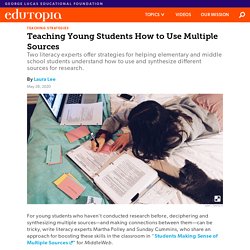
First, Polley and Cummins say sources need to be organized in a way that helps students access different types of material at varying levels of complexity. In a history class, this could mean giving students a primary document, a video to watch, and a historian’s account of a particular time period. Picture Books For Digital Citizenship and Media Literacy Conversations and Learning. Evaluating Information: The Cornerstone of Civic Online Reasoning. Fact check: Kamala Harris quote on “vengeance of a nation” fabricated by satire website. Templates – Learning with Christine Pinto. The Markup.
How to stop websites from tracking you. From the moment you connect your laptop or phone to the internet, you have to make peace with the fact that somebody’s tracking you.
If this is upsetting, you should know you’ve got a growing number of options for finding out who is following your every move on the internet, and why. How do you explain the web to your kids? There’s no way I could respond to the following tweet in 140 characters, so I’m writing a blog post instead!
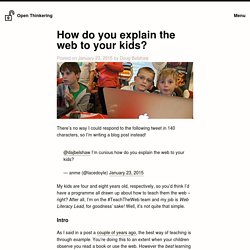
@dajbelshaw I’m curious how do you explain the web to your kids? — anme (@lacedoyle) January 23, 2015 My kids are four and eight years old, respectively, so you’d think I’d have a programme all drawn up about how to teach them the web – right? The internet explained for 4 year old kids. Yesterday, after receiving the question that every parent is afraid of, I spent 40 minutes explaining the answer to my 4 year old daughter Nathalie, the answer to the fateful question: Hey Dad, what’s the internet?.
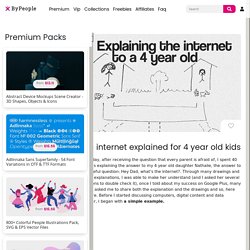
Through many drawings and simple explanations, I was able to make her understand (and I asked her several questions to double check it), once I told about my success on Google Plus, many people asked me to share both the explanation and the drawings and so, here they are. Before I started discussing computers, digital content and data transfer, I began with a simple example.
Staying Safe Online (K-2) EJ1190637 - Media Literacy & the AASL Standards, Knowledge Quest, 2018. School librarians must teach media literacy and be on the forefront of defining what media literacy is and why it is important for students and communities.
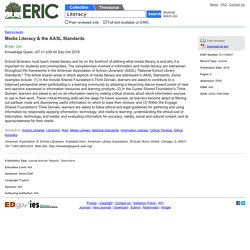
The competencies involved in information and media literacy are interwoven throughout the frameworks in the American Association of School Librarians' (AASL) "National School Library Standards. " - Assessing Computer Literacy of Adults with Low Literacy Skills, International Educational Data Mining Society, 2017-Jun. Adaptive learning technologies hold great promise for improving the reading skills of adults with low literacy, but adults with low literacy skills typically have low computer literacy skills.
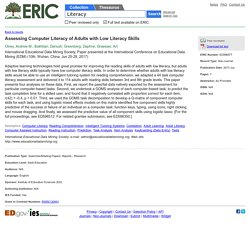
In order to determine whether adults with low literacy skills would be able to use an intelligent tutoring system for reading comprehension, we adapted a 44 task computer literacy assessment and delivered it to 114 adults with reading skills between 3rd and 8th grade levels. This paper presents four analyses on these data. First, we report the pass/fail data natively exported by the assessment for particular computer-based tasks. - Financial Literacy: Annotated Bibliography, National Technical Assistance Center on Transition, 2016. When students graduate from high school they often experience independence that includes (a) moving out on their own, (b) forming new relationships, and (c) supporting themselves financially.
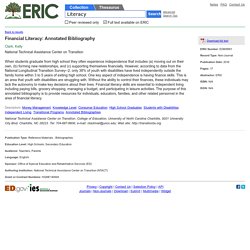
However, according to data from the National Longitudinal Transition Survey--2, only 38% of youth with disabilities have lived independently outside the family home within 3 to 5 years of exiting high school. One key aspect of independence is having finance skills. This is an area that youth with disabilities are struggling with. Without the ability to control their finances, these individuals may lack the autonomy to make key decisions about their lives. EJ1251924 - Digital Literacy of Future Preschool Teachers, Journal of Social Studies Education Research, 2020. The basics of digital literacy begin to form at an early age, and as they grow older, digital literacy must continue to evolve, adapting to the rapidly changing digital world.
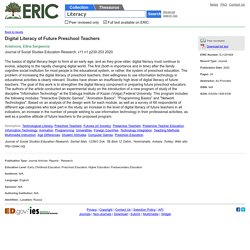
The first (both in importance and in time) after the family cognitive social institution for most people is the educational system, or rather, the system of preschool education. The problem of increasing the digital literacy of preschool teachers, their willingness to use information technology in educational activities is clearly relevant. Studies have shown an insufficiently high level of digital literacy of future teachers. The goal of this work is to strengthen the digital literacy component in preparing future preschool educators. The authors of the article conducted an experimental study on the introduction of a new program of study of the discipline "Information Technology" at the Elabuga Institute of Kazan (Volga) Federal University.
Journal of Social Studies Education Research. EJ1211197. JAN200027 - FCBD 2020 OWLY THE WAY HOME - Free Comic Book Day. Home - Media Literacy Clearinghouse. Today’s Front Pages. Media Literacy October 2019. Empowerment through Education. 10 Twitter how-tos for Twitter’s 10th birthday. Evaluating Information: The Cornerstone of Civic Online Reasoning. Truth, truthiness, triangulation: A news literacy toolkit for a “post-truth” world.
We were guaranteed a free press, We were not guaranteed a neutral or a true press.
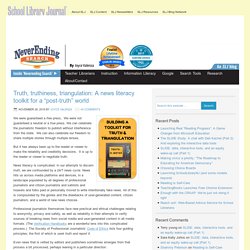
We can celebrate the journalistic freedom to publish without interference from the state. We can also celebrate our freedom to share multiple stories through multiple lenses. But it has always been up to the reader or viewer to make the reliability and credibility decisions. Learn to Type. Northstar Digital Literacy. This page includes a variety of publicly available learning resources for the Northstar standards.
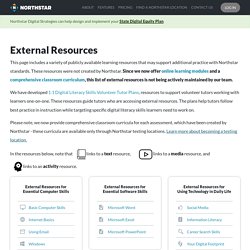
These resources are not created by Northstar, but have been selected by our staff. We also provide comprehensive classroom curricula for each assessment, which have been created by Northstar - these curricula are available only through Northstar testing locations. Learn more about becoming a testing location. In the resources below, note that links to a text resource, Computer & Internet Basics — EveryoneOn. Northstar Digital Literacy. March 18, 2020 Updated 7/16/20 with information on 1:1 Digital Literacy Skills Volunteer Tutor Plans. Testing locations: as the COVID-19 situation progresses, we are aware that the ways in which testing locations use Northstar may well change. Reading Online. Home › Professional Development › Strategy Guides Strategy Guide Research suggests that online reading requires a different set of skills and strategies than offline reading. These different skills and strategies are required because online reading is frequently information seeking, guided by the reader (rather than the teacher) and non-linear (readers follow a series of hyperlinks and navigate through multiple windows rather than reading something from beginning to end).
The skills required for successful online reading are: the ability to formulate appropriate questions, locate reliable information, and evaluate, synthesize and communicate that information.